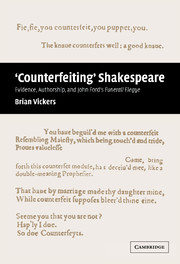Prologue. Gary Taylor finds a poem
Published online by Cambridge University Press: 10 December 2009
Summary
On 24 November 1985 purchasers of the Sunday Times found their breakfast reading enlivened by a challenging question: ‘Is this by Shakespeare?’. The work referred to was a poem printed on page 3 of that issue, beginning like this:
Shall I die? Shall I fly
Lovers' baits and deceits,
sorrow breeding?
Shall I tend? Shall I send?
Shall I sue, and not rue
my proceeding?
In all duty her beauty
Binds me her servant for ever.
If she scorn, I mourn,
I retire to despair, joying never.
How did this ‘discovery’ come about? In the words of Gary Taylor, to whom the ‘discovery’ was credited: ‘on the evening of Nov. 14’ while ‘routinely checking references in the Bodleian Library, I came across an item I did not recognize’, and ‘asked for the manuscript to be fetched’. Next day, at first view, he was already convinced:
I found the literary equivalent of Sleeping Beauty, a nameless poem awakening from the ancient sheets in which it had lain undisturbed for centuries, a poem without a critical history.
Within a week, a little week, ‘with the help and advice of my senior colleague’ on the Oxford Shakespeare project, Stanley Wells, Taylor ‘had subjected the poem to every accepted test of authenticity; the results were all positive and we could think of nothing else to check’ (Taylor 1985a, p. 11).
- Type
- Chapter
- Information
- 'Counterfeiting' ShakespeareEvidence, Authorship and John Ford's Funerall Elegye, pp. 1 - 54Publisher: Cambridge University PressPrint publication year: 2002



